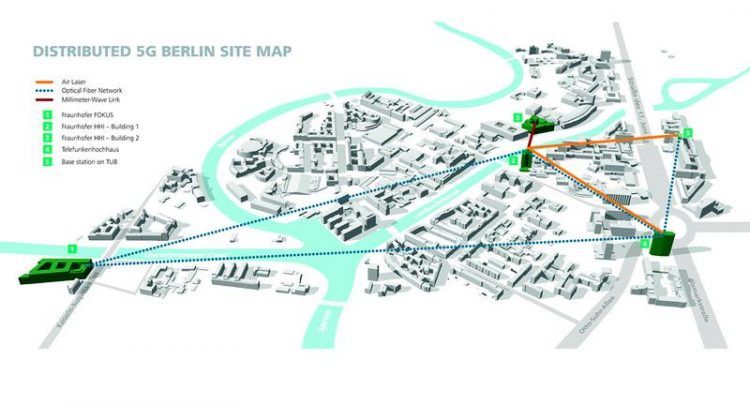MWC 2017: 5G Capital Berlin

Infographic: Site map of the experimental 5G-Infrastructure in Berlin Fraunhofer FOKUS
Berlin is not only a hip party city but also has a lot to offer technologically and scientifically. Information technology and software development are researched in 85 scientific institutions¹ and being taught to students at universities, making them some of the best equipped people for the global labor market and ensuring Germany’s leading position.
In the year 2015, 18,500 students were enrolled in IT related subjects.² 70 percent (2,1 Billion Euro) of the total risk capital in Germany was invested into start-ups in Berlin³, making Berlin an ideal environment for the development of new technologies such as the 5G network standard.
Starting 2020, 5G Infrastructures will deliver significantly higher bandwidths and lower latency in data transmission world-wide. Integrated heterogeneous networks will connect billions of devices and sensors seamlessly allowing them to react dynamically to application requirements.
At the MWC, Fraunhofer FOKUS will present the test environment 5G Berlin. With the help of the platform, companies and research organizations can try out and test their products for ”5G Readiness”, to see if within a 5G environment they work smoothly with other components, long before the commercial use and the completion of the standardization processes.
Prof. Dr. Thomas Magedanz, director of the business unit Software-based Networks of Fraunhofer FOKUS summarizes: “After the initial 5G hype with some exaggerated application scenarios like the operating robot at the other end of the world that is controlled across continents, now the ‘working phase’ for telecommunications companies and research institutes has begun.
Fraunhofer FOKUS is working with partners from industry and research on 5G standards that allow the user to integrate existing broad-band mobile and fixed access into highly flexible 5G core networks. Applications using this integrated network platform have diverse requirements with regard to the latency, data volumes and security.
Through an intelligent network design with virtual, dynamically configurable network services on a distributed data center infrastructure, it can be ensured that the application-specific requirements, the necessary service intelligence and data processing can be placed at the optimal place within the network thereby providing the optimal network infrastructure. This concept is called ‚Edge Computing‘. We are happy to support Berlin in positioning itself worldwide as a leading 5G Capital, through our ‚5G Ready-Tools‘.”
5G Berlin, an initiative of Fraunhofer Institute FOKUS and HHI, is a partner of the Berlin iSquare Program of the federal state of Berlin, an initiative of the Senate Department for Economics, Energy and Public Enterprises. Berlin wants to be one of the first federal states to test a 5G network under realistic conditions and to subsequently promote the implementation of this infrastructure in Berlin. This plan is part of the Digital Agenda of the federal state of Berlin.
Therefore the Senate Department for Economics, Energy and Public Enterprises initiates and accompanies a 5G test field in the public space with the participation of companies, which are active in Berlin. Companies, startups and organizations will launch projects in which, on the basis of modern information and communications infrastructures with open interfaces, the expertise of the various partners can be bundled.
“The 5G pilot projects have the goal to create the foundation for an intelligent city based on the motto ,Smart Network for Smart City‘ and thereby to improve the quality of life of the residents of a growing city.“, says Senator for Economic Affairs Ramona Pop. “In the face of all the challenges and innovations in the digital transformation, the benefits for the user should be paramount – even if behind it complex new infrastructures and technologies are lying. The Senate Department for Economics, Energy and Public Enterprises is open to new ideas and projects. I am looking forward to a dialogue with the stakeholders.”
5G has a broad filed of applications: For example, video and music streaming will improve through 5G. Currently streaming is only possible at lower speeds. Even in a normal ICE (Intercity Express) the connection is often lost. In the future 5G should permit the transmission in high speed trains (up to 500 km/h) and airplanes (up to 1000 km/h). Further important applications could be mobile video in self-driving cars or augmented reality.
Press contacts:
Senate Department for Economics, Energy and Public Enterprises
Sven Siebert, Press Officer
Phone: +49 (0) 30 9013 -8451
Sven.Siebert@senweb.berlin.de
Fraunhofer Institute for Open Communication Systems
Mitra Motakef-Tratar
Corporate Communications
Phone: +49 30 3463-7517
mitra.motakef-tratar@fokus.fraunhofer.de
Fraunhofer FOKUS
Fraunhofer FOKUS researches digital transformation and its impact on society, economics and technology. Since 1988 it supports commercial enterprises and public administration in the shaping and implementation of the digital transformation. For this purpose, Fraunhofer FOKUS offers research services ranging from requirements analysis to consulting, feasibility studies, technology development right up to prototypes and pilots in the business segments Digital Public Services, Future Applications and Media, Quality Engineering, Smart Mobility, Software-based Networks, Networked Security, Visual Computing und Analytics. With about 430 employees in Berlin and an annual budget of 30 million euros, Fraunhofer FOKUS is the largest ICT institute of the Fraunhofer Society. Around 70% of its budget is generated through projects from industry and the public domain.
Sources:
1 Source: http://www.businesslocationcenter.de/de/wirtschaftsstandort/branchen-cluster/ikt…
2 Source: http://www.berlin.de/projektzukunft/uploads/tx_news/Projekt_Zukunft_Standortfakt…
3 Source: http://www.ey.com/de/de/newsroom/news-releases/ey-20160121-rekordsumme-fuer-deut…
Media Contact
More Information:
http://www.fokus.fraunhofer.deAll latest news from the category: Trade Fair News
Newest articles

A universal framework for spatial biology
SpatialData is a freely accessible tool to unify and integrate data from different omics technologies accounting for spatial information, which can provide holistic insights into health and disease. Biological processes…

How complex biological processes arise
A $20 million grant from the U.S. National Science Foundation (NSF) will support the establishment and operation of the National Synthesis Center for Emergence in the Molecular and Cellular Sciences (NCEMS) at…

Airborne single-photon lidar system achieves high-resolution 3D imaging
Compact, low-power system opens doors for photon-efficient drone and satellite-based environmental monitoring and mapping. Researchers have developed a compact and lightweight single-photon airborne lidar system that can acquire high-resolution 3D…





















